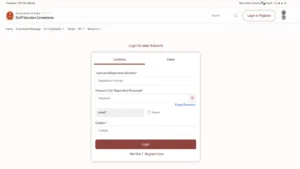Preparing for the IBPS Agriculture Field Officer Exam 2026 can feel overwhelming, especially for first-time candidates who are unsure where to start and they must have a question, How to Start Preparing for IBPS AFO 2026? The exam requires a good grasp of agriculture-related subjects along with reasoning, quantitative skills, and English. For recent graduates or those looking to transition into the banking and agriculture sectors, having a clear and organized preparation plan is essential. This beginner’s guide offers important strategies and tips to help candidates on their journey toward success with clarity.
How to Start Preparing for IBPS AFO 2026?
Starting from scratch, the preparation for the IBPS AFO 2026 should begin with a solid study schedule and consistent practice. Developing a clear understanding of key concepts, staying dedicated, and using the right resources can make the preparation process smoother and more effective. Below, we provide the complete IBPS AFO preparation strategy.
Look at the Syllabus and Exam Pattern
The first step is to closely examine the exam pattern and syllabus. Doing so helps aspirants identify which topics to focus on and how the paper is structured. Knowing this early enables them to plan effectively, prioritize subjects, and avoid wasting time on unnecessary material.
Check – IBPS AFO Syllabus and Exam Pattern
Part 1: IBPS AFO Prelims Strategy (Qualifying Nature)
The IBPS AFO Prelims exam is qualifying in nature and is used only to shortlist candidates for the Mains exam. The goal is to clear sectional and overall cutoffs with accuracy and proper time management, not to score very high marks.
How to Apply the 40-40-20 Rule in Prelims Preparation
Divide your daily Prelims study time as follows:
- 40% time for Quantitative Aptitude
- 40% time for Reasoning Ability
- 20% time for English Language
Maintain this ratio daily during preparation and while practicing mock tests.
Quantitative Aptitude – How to Prepare
Quantitative Aptitude should be prepared by focusing on repeated and scoring topics instead of the full syllabus.
Step 1: Passing Topics
Practice these topics daily:
- Simplification and Approximation
- Number Series
- Quadratic Equations
These topics are easy to score and help secure marks quickly.
Step 2: Data Interpretation
Practice:
- Tabular DI
- Bar graphs
- Line graphs
- Pie charts
Focus on percentage and average calculations.
Step 3: Limited Arithmetic Topics
Select 3–4 topics and revise them repeatedly:
- Ratio and Proportion
- Percentage
- Average
- Profit and Loss
Avoid time-consuming topics at the initial stage.
Reasoning Ability – How to Prepare
Reasoning preparation should focus on speed and accuracy through regular practice.
Speed Block
Practice these topics regularly:
- Syllogism
- Inequalities
- Coding-Decoding
- Blood Relations
Challenge Block
Practice daily:
- One seating arrangement set
- One puzzle set
These questions play a key role in clearing the cutoff.
English Language – How to Prepare
English preparation should focus on habit-based learning and accuracy.
Daily Routine
- Read one editorial
- Note new words
- Revise weekly
- Grammar and Practice Areas
Focus on:
- Subject-Verb Agreement
- Tenses
- Prepositions
- Cloze Test
- Para Jumbles
- Sentence Correction
Accuracy is more important than attempts.
Part 2: IBPS AFO Mains Strategy (Scoring Nature)
The Mains exam decides the final selection and requires in-depth agriculture knowledge. All major syllabus areas must be covered systematically.
Block 1: Banker Block
Focus on agriculture-related banking topics.
Agriculture Finance
Prepare:
- Kisan Credit Card
- Types of agricultural loans
- NABARD functions
- PMFBY
Government Schemes
Study schemes based on:
- Launch year
- Objective
- Beneficiary
- Subsidy
Block 2: Foundation Block
Cover core agriculture subjects.
Crop Production
Focus on:
- Crop seasons
- Scientific names
- Seed rate
- Irrigation stages
Soil Science and Irrigation
Prepare:
- Soil types
- Nutrient deficiencies
- Fertilizer types
- Irrigation methods
Block 3: Allied Block
Do not skip allied subjects.
Horticulture
- Fruit varieties
- Commercial practices
Animal Husbandry
- Breeds
- Milk fat percentage
- Common diseases
Entomology and Pathology
- Pest–crop relation
- Disease–organism relation
Block 4: Miscellaneous and Current Affairs
Prepare limited and relevant topics.
Static Topics
- Seed certification tags
- Farm machinery basics
Current Affairs (Last 6 Months)
- MSP
- Agriculture budget
- Census updates
Weekly Study Routine
- Morning: Mains concept study
- Afternoon: Prelims practice
- Evening: Revision and current affairs
- Saturday: Prelims mock test and analysis
- Sunday: Mains revision
| Related Posts |
| IBPS AFO Previous Year Paper |




 SSC MTS Admit Card 2026 OUT for Re-Exam,...
SSC MTS Admit Card 2026 OUT for Re-Exam,...
 OICL AO Mains Admit Card 2026 Out, Downl...
OICL AO Mains Admit Card 2026 Out, Downl...
 Assam Police Jail Warder Physical Date 2...
Assam Police Jail Warder Physical Date 2...




 Adda247 Job portal has complete information about all Sarkari Jobs and Naukri Alerts, its latest recruitment notifications, from all state and national level jobs and their updates.
Adda247 Job portal has complete information about all Sarkari Jobs and Naukri Alerts, its latest recruitment notifications, from all state and national level jobs and their updates.




